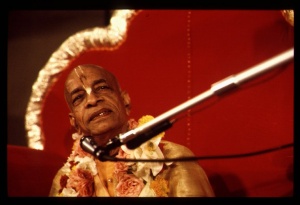SB 4.25.21: Difference between revisions
m (1 revision(s)) |
No edit summary |
||
| Line 1: | Line 1: | ||
{{info | {{info | ||
|speaker= | |speaker=Nārada Muni | ||
|listener=King | |listener=King Prācīnabarhiṣat | ||
}} | }} | ||
[[Category:Srimad-Bhagavatam - Canto 04 Chapter 25]] | |||
[[Category:Bhagavatam Verses Spoken by Narada Muni - Vanisource|042521]] | |||
<div style="float:left">'''[[Srimad-Bhagavatam]] - [[SB 4|Fourth Canto]] - [[SB 4.25: The Descriptions of the Characteristics of King Puranjana|Chapter 25: The Descriptions of the Characteristics of King Purañjana]]'''</div> | |||
<div style="float:right">[[File:Go-previous.png|link=SB 4.25.20]] '''[[SB 4.25.20]] - [[SB 4.25.22]]''' [[File:Go-next.png|link=SB 4.25.22]]</div> | |||
{{RandomImage}} | |||
==== TEXT 21 ==== | ==== TEXT 21 ==== | ||
<div | <div class="verse"> | ||
pañca-śīrṣāhinā guptāṁ | :pañca-śīrṣāhinā guptāṁ | ||
pratīhāreṇa sarvataḥ | :pratīhāreṇa sarvataḥ | ||
anveṣamāṇām ṛṣabham | :anveṣamāṇām ṛṣabham | ||
aprauḍhāṁ kāma-rūpiṇīm | :aprauḍhāṁ kāma-rūpiṇīm | ||
</div> | </div> | ||
| Line 16: | Line 22: | ||
==== SYNONYMS ==== | ==== SYNONYMS ==== | ||
<div | <div class="synonyms"> | ||
''pañca''—five; ''śīrṣa''—heads; ''ahinā''—by a snake; ''guptām''—protected; ''pratīhāreṇa''—by a bodyguard; ''sarvataḥ''—all around; ''anveṣamāṇām''—one who is searching after; ''ṛṣabham''—a husband; ''aprauḍhām''—not very old; ''kāma-rūpiṇīm''—very attractive to fulfill lusty desires. | |||
</div> | </div> | ||
| Line 23: | Line 29: | ||
==== TRANSLATION ==== | ==== TRANSLATION ==== | ||
<div | <div class="translation"> | ||
The woman was protected on all sides by a five-hooded snake. She was very beautiful and young, and she appeared very anxious to find a suitable husband. | The woman was protected on all sides by a five-hooded snake. She was very beautiful and young, and she appeared very anxious to find a suitable husband. | ||
</div> | </div> | ||
| Line 30: | Line 36: | ||
==== PURPORT ==== | ==== PURPORT ==== | ||
<div | <div class="purport"> | ||
The vital force of a living entity includes the five kinds of air working within the body, which are known as prāṇa, apāna, vyāna, samāna and udāna. The vital force is compared to a serpent because a serpent can live by simply drinking air. The vital force carried by the air is described as the pratīhāra, or the bodyguard. Without the vital force one cannot live for a moment. Indeed, all the senses are working under the protection of the vital force. | The vital force of a living entity includes the five kinds of air working within the body, which are known as ''prāṇa, apāna, vyāna, samāna'' and ''udāna''. The vital force is compared to a serpent because a serpent can live by simply drinking air. The vital force carried by the air is described as the ''pratīhāra'', or the bodyguard. Without the vital force one cannot live for a moment. Indeed, all the senses are working under the protection of the vital force. | ||
The woman, who represents intelligence, was searching after a husband. This indicates that intelligence cannot act without consciousness. A beautiful woman is useless unless protected by the proper husband. Intelligence must always be very fresh; therefore the word aprauḍhām ("very young") is used here. Material enjoyment means utilizing the intelligence for the sake of rūpa, rasa, gandha, śabda and sparśa, or form, taste, smell, sound and touch. | The woman, who represents intelligence, was searching after a husband. This indicates that intelligence cannot act without consciousness. A beautiful woman is useless unless protected by the proper husband. Intelligence must always be very fresh; therefore the word ''aprauḍhām'' ("very young") is used here. Material enjoyment means utilizing the intelligence for the sake of ''rūpa, rasa, gandha, śabda'' and ''sparśa,'' or form, taste, smell, sound and touch. | ||
</div> | </div> | ||
__NOTOC__ | |||
<div style="float:right; clear:both;">[[File:Go-previous.png|link=SB 4.25.20]] '''[[SB 4.25.20]] - [[SB 4.25.22]]''' [[File:Go-next.png|link=SB 4.25.22]]</div> | |||
__NOTOC__ | |||
__NOEDITSECTION__ | |||
Revision as of 13:00, 28 May 2021

A.C. Bhaktivedanta Swami Prabhupada
TEXT 21
- pañca-śīrṣāhinā guptāṁ
- pratīhāreṇa sarvataḥ
- anveṣamāṇām ṛṣabham
- aprauḍhāṁ kāma-rūpiṇīm
SYNONYMS
pañca—five; śīrṣa—heads; ahinā—by a snake; guptām—protected; pratīhāreṇa—by a bodyguard; sarvataḥ—all around; anveṣamāṇām—one who is searching after; ṛṣabham—a husband; aprauḍhām—not very old; kāma-rūpiṇīm—very attractive to fulfill lusty desires.
TRANSLATION
The woman was protected on all sides by a five-hooded snake. She was very beautiful and young, and she appeared very anxious to find a suitable husband.
PURPORT
The vital force of a living entity includes the five kinds of air working within the body, which are known as prāṇa, apāna, vyāna, samāna and udāna. The vital force is compared to a serpent because a serpent can live by simply drinking air. The vital force carried by the air is described as the pratīhāra, or the bodyguard. Without the vital force one cannot live for a moment. Indeed, all the senses are working under the protection of the vital force.
The woman, who represents intelligence, was searching after a husband. This indicates that intelligence cannot act without consciousness. A beautiful woman is useless unless protected by the proper husband. Intelligence must always be very fresh; therefore the word aprauḍhām ("very young") is used here. Material enjoyment means utilizing the intelligence for the sake of rūpa, rasa, gandha, śabda and sparśa, or form, taste, smell, sound and touch.